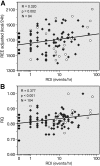Poor sleep quality and sleep apnea are associated with higher resting energy expenditure in obese individuals with short sleep duration
- PMID: 22689694
- PMCID: PMC3410277
- DOI: 10.1210/jc.2011-2858
Poor sleep quality and sleep apnea are associated with higher resting energy expenditure in obese individuals with short sleep duration
Abstract
Context: Epidemiological studies reported an inverse or U-shaped relationship between sleep duration and weight. The relationship between sleep and resting energy expenditure (REE) has not been well characterized.
Objective: The aim of the study was to determine the relationship between sleep, REE, and stress hormones.
Design and setting: We conducted a cross-sectional evaluation of a prospective cohort study at a tertiary referral research clinical center.
Subjects: Subjects included 126 obese individuals (30 males, 96 females; age, 40.5 ± 6.9 yr; body mass index, 38.6 ± 6.5 kg/m(2); sleep duration, 360 ± 50 min/night; and sleep efficiency, 79.5 ± 7.5%).
Main outcome measure(s): REE and respiratory quotient (RQ) were assessed by indirect calorimetry. Sleep duration and sleep efficiency were assessed by actigraphy. Sleep quality was estimated by questionnaires, and sleep apnea was evaluated by respiratory disturbance index (RDI). Morning plasma ACTH, serum cortisol, and 24-h urinary free cortisol and catecholamines were also measured.
Results: RDI was positively correlated with REE adjusted by fat-free mass (r = 0.307; P = 0.003) and RQ (r = 0.377; P < 0.001). Sleep efficiency was inversely correlated with RQ (r = -0.200; P = 0.033). The relationship of RDI score and REE was stronger in men than women (P = 0.03). In women, serum cortisol was positively correlated (r = 0.407; P < 0.001), and Epworth sleepiness score tended to be inversely (r = -0.190; P = 0.086) correlated with adjusted REE. The RQ was positively related to RDI in women, whereas subjective sleep time was related to RQ in men. In a multiple regression model, RDI, serum cortisol, and urinary norepinephrine were directly related to REE, whereas serum cortisol also directly related to adjusted REE.
Conclusion: Poor sleep quality was associated with increased REE, a higher RQ indicating a shift from fat toward carbohydrate oxidation, and activation of the stress system.
Trial registration: ClinicalTrials.gov NCT00261898.
Figures
Similar articles
-
Fuel metabolism in adult individuals with a wide range of body mass index: effect of a family history of type 2 diabetes.Diabetes Nutr Metab. 2003 Feb;16(1):41-7. Diabetes Nutr Metab. 2003. PMID: 12848304
-
Relationship of evening meal with sleep quality in obese individuals with obstructive sleep apnea.Clin Nutr ESPEN. 2019 Feb;29:231-236. doi: 10.1016/j.clnesp.2018.09.077. Epub 2018 Oct 21. Clin Nutr ESPEN. 2019. PMID: 30661692
-
Resting energy expenditure in adults with sleep disordered breathing.Arch Otolaryngol Head Neck Surg. 2008 Dec;134(12):1270-5. doi: 10.1001/archotol.134.12.1270. Arch Otolaryngol Head Neck Surg. 2008. PMID: 19075121
-
Decreased respiratory quotient in relation to resting energy expenditure in HIV-infected and noninfected subjects.Metabolism. 2009 May;58(5):608-15. doi: 10.1016/j.metabol.2008.12.005. Metabolism. 2009. PMID: 19375582 Free PMC article.
-
Energy expenditure in obstructive sleep apnea.Sleep. 1995 Apr;18(3):180-7. doi: 10.1093/sleep/18.3.180. Sleep. 1995. PMID: 7610314
Cited by
-
Inverse relationship of food and alcohol intake to sleep measures in obesity.Nutr Diabetes. 2013 Jan 28;3(1):e58. doi: 10.1038/nutd.2012.33. Nutr Diabetes. 2013. PMID: 23357877 Free PMC article.
-
The Influence of CPAP Therapy on Basal Metabolic Rate and Physical Activity in Obese Patients with Obstructive Sleep Apnea.Nutrients. 2023 Oct 20;15(20):4446. doi: 10.3390/nu15204446. Nutrients. 2023. PMID: 37892521 Free PMC article.
-
Sleep extension improves neurocognitive functions in chronically sleep-deprived obese individuals.PLoS One. 2014 Jan 15;9(1):e84832. doi: 10.1371/journal.pone.0084832. eCollection 2014. PLoS One. 2014. PMID: 24482677 Free PMC article. Clinical Trial.
-
Sleep disturbances, body fat distribution, food intake and/or energy expenditure: pathophysiological aspects.Horm Mol Biol Clin Investig. 2014 Jan;17(1):29-37. doi: 10.1515/hmbci-2013-0066. Horm Mol Biol Clin Investig. 2014. PMID: 25372728 Free PMC article. Review.
-
Resting energy expenditure and blood pressure: evidence of perpetual association.J Clin Hypertens (Greenwich). 2014 Mar;16(3):166-7. doi: 10.1111/jch.12267. Epub 2014 Feb 19. J Clin Hypertens (Greenwich). 2014. PMID: 24548414 Free PMC article. No abstract available.
References
-
- Centers for Disease Control and Prevention (CDC) 2011. Effect of short sleep duration on daily activities—United States, 2005–2008. MMWR Morb Mortal Wkly Rep 60:239–242 - PubMed
-
- Johnson EO. 2000. Sleep in America: 2000. Results from The National Sleep Foundation's 2000 Omnibus Sleep Poll. Washington, DC: National Sleep Foundation
-
- Monroe LJ. 1967. Psychological and physiological differences between good and poor sleepers. J Abnorm Psychol 72:255–264 - PubMed



